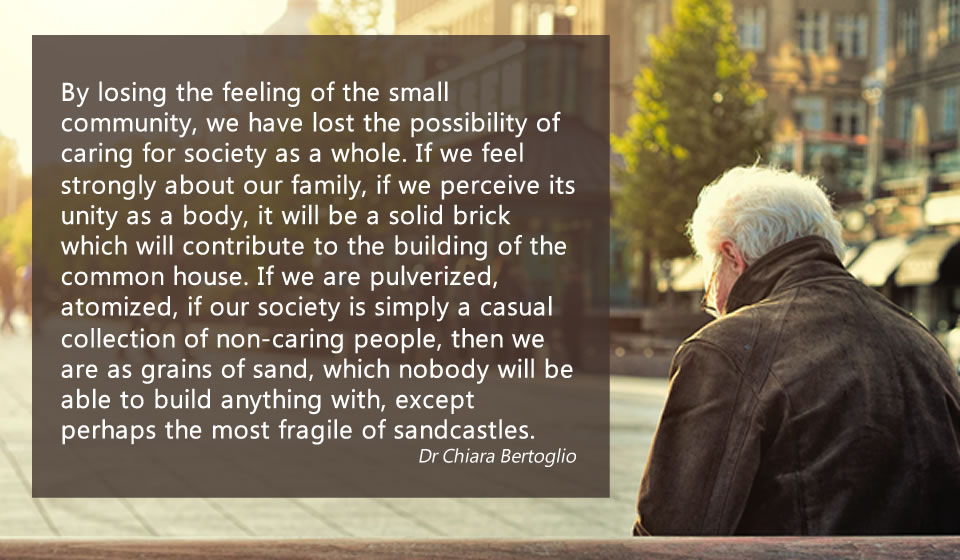
The following article by Dr Chiara Bertoglio, first appears appeared on MercatoroNet and is republished here, under a Creative Commons licence.
Sixsmith and Paul Rowan Brian have published a very interesting piece in Public Discourse and MercatorNet identifying “apatheists” as the most dangerous enemies of believers today. Christians and people belonging to other major creeds are “theists”, that is, believers in a divine Being, a God, a Theos in Greek. A-theists are those who profess that there is no divine Being, and no supernatural entity. “Apatheists” is a brilliant neologism which describes the increasingly common stance of those who don’t care whether or not God exists.
In Western societies, apatheists make up a substantial part of the population. We are all familiar with people who seem to be perfectly indifferent to the greatest questions of humankind, to that primaeval call to philosophy which is an integral component of what it means to be human. People who are reluctant to be drawn into meaningful conversation about transcendent topics, and whose greatest contribution to the reasoning on first things is shoulder-shrugging.
I fully share the article’s thesis and viewpoint and am grateful to its author for articulating them clearly and compellingly. To this, I would add a further reflection, provoked both by this article and by my recent reading of a beautiful book by and about Dietrich von Hildebrand (My Battle Against Hitler). Hildebrand contrasts the concept of community with that of mass. Writing during the horrible years of Nazism (and when Bolshevism was proving itself equally destructive and dehumanizing), Hildebrand was careful to distinguish between the alienated masses, whose rationality and free will were seemingly obliterated by totalitarianism and the positive power of communitas – of communities such as family and church.
In most Western countries, the feeling of community is thinning at worrisome speed. Families are shrinking numerically, both as to the number of families and the number of their members. Many of them dissolve quickly, with new bonds multiplying up to the point that – as I once heard a child telling somebody in a train – one can have eight grandparents (!). When families become so fluid they evaporate, and the strength they should contribute to society is lost.
Most people don’t attend church; and – speaking from the viewpoint I know best – even among practising believers it is only infrequently that one knows the other members of the congregation by name, let alone anything meaningful about them and their lives. We pray side by side, but I frequently doubt whether we really pray “together”, much less if we pray “as one”.
One of the many advantages of thriving and flourishing communities is that they work as supporting forces when one is in need, but also as networks protecting and promoting shared values. I’m perfectly aware that “social control” may degenerate into bigotry, and may create a world of “don’ts” and “can’ts” which can suffocate the initiative which ought to flourish in a healthy society. But if a community is really sane, it will tolerate the proper amount of novelty, and even a salutary drop of folly, at the same time exercising a positive check on those disruptive forces which undermine the community’s wellbeing.
This is not an altogether original idea. The American sociologist Robert Putnam has documented the erosion of social capital in his famous book Bowling Alone. Americans were no longer joining community organisations and were less engaged in politics; they were no longer a nation of volunteers. He thought that the engine for the change was technology. Television, increasing commuting time and the internet were making people more and more individualistic. And socially disconnected individuals are unhappier, less healthy, poorer and more prone to crime. Civic disengagement, he found, is toxic for civil society.
Today’s society, both in the dilution of its social bonds, and in the modern principle that individuals have the right of defining not only their identity but their gender, how and when to end their lives, their right to parenthood and so on, makes it almost compulsory not to care about what the other is doing. I think that most people are deeply disturbed by, say, the selling of human beings which characterizes commercial surrogacy, or feel ill at ease with protocols promoting gender “transitioning” for children and teenagers; but it is politically incorrect to voice these feelings, it is socially dangerous, and it is best to confine oneself simply to an “apatheist” attitude.
We don’t feel that our fellow citizens belong to the same society as us; we don’t think that to promote erroneous values, wrong beliefs and dangerous practices is something which endangers our own lives, our own present and future wellbeing, and the society we are building for the generations to come.
By losing the feeling of the small community, we have lost the possibility of caring for society as a whole. If we feel strongly about our family, if we perceive its unity as a body, it will be a solid brick which will contribute to the building of the common house. If we are pulverized, atomized, if our society is simply a casual collection of non-caring people, then we are as grains of sand, which nobody will be able to build anything with, except perhaps the most fragile of sandcastles.
We must learn to care again, to know our neighbours and to be concerned for them; to voice our worries for our society, to promote those values which are positive for making it healthy; we must make our social bonds solid, strong and powerful if we value communities as the habitat where humanity can flourish.
Dr Chiara Bertoglio is a musician and theologian moonlighting as a journalist. She writes from Italy. Visit her website.









0 Comments